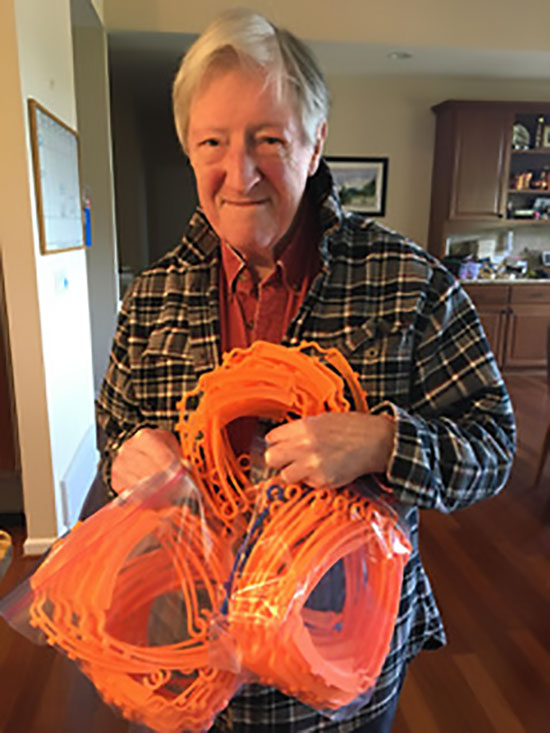Glacier Peak High senior Dylan Reiner, part of the Sonic Squirrels team, sits with a 3D printer used to make personal protective equipment parts.
courtesy Sean Wilson
SNOHOMISH — Snohomish high school students in the Sonic Squirrels robotics team have utilized their 3D printers to help make face shields for medical centers across the Puget Sound as health care workers are still in need of personal protective equipment.
“You see it in the news. The PPE shortage was dramatic and very quick,” said Susan Dole, a parent mentor for the Squirrels. “It didn’t take long to look around and find other teams and groups that were immediately trying to produce, or create PPE.”
The Sonic Squirrels are a combined team of 40 students and 25 parent mentors largely from Glacier Peak and Snohomish high schools. They participate in the FIRST program (For Inspiration and Recognition of Science and Technology), a worldwide organization which promotes advancing STEM education through annual science competitions across the globe.
The Squirrels have reached the FIRST Robotics Competition World Championship three times since 2015, competing against teams from countries such as China, Australia, Mexico and Turkey.
Dole said that after the pandemic hit, dozens of robotics teams across the U.S., and all over the world, offered their 3D printers to help. Her father, a retired engineer and senior mentor on the team, came up with the idea to work with other outreach groups in the local area.
Students on the team voted to fund the PPE project using money they raised through various fundraising events, corporate sponsorships and grants over the year.
Through their FIRST connections on Facebook, the Squirrels team found Brent and Kelley Picasso, co-founders of Autosport Labs, which manufactures electronics for racecar applications.
Autosport, too, has a 3D printer, and already put together a group to produce and distribute PPE to medical centers.
Together, the group is printing parts to make National Institutes of Health-approved face shields, along with ear savers that prevent irritation from wearing regular face masks for too long.
According to Kelley Picasso, the face shield’s clear visor is made from a polyester binder cover. The face shield’s frame, and ear savers are made from a plastic filament called PETG, or Polyethylene Terephthalate Glycol-modified, which is typical for use with 3D printing.
Since the area’s schools closed, Dole has had one of the Squirrels’ 3D printers at her home where she prints frames for face shields. Two other Squirrel families have printers in their homes as well. Altogether, Dole said that the Squirrels have printed more than 300 face shield frames for Picasso’s group.
According to Kelley Picasso, it costs $2.50 on average to produce a face shield. So far the Picasso group has made about 1,500 face shields, and about 200 ear savers. All can be sanitized and used repeatedly, Dole said.
Kelley said that the group has delivered PPE as far north as to an air ambulance company in the San Juan Islands, and as far south as a medical center in Enumclaw. One of her early deliveries went to the Swedish Birth Center in Issaquah.
The Squirrels have focused on smaller medical centers, such as retirement and nursing homes, memory care and rehabilitation centers, homeless shelters, and emergency dental centers, because larger hospitals tend to buy in bulk, according to Dole.
Kelley and Dole have been making cold calls to health facilities across the Puget Sound to discover their needs.
“Most of these places still cannot get this type of essential equipment in small numbers, affordably, or with the ability to sanitize and reuse it,” said Dole. “The Picassos and other volunteers coordinate contact-free drop-offs of the equipment.”
For the Sonic Squirrels, social outreach is nothing new. According to student outreach officer and Glacier Peak High junior Ryan Krismer, the Squirrels have been involved in 30 different outreach events since last summer. This outreach includes mentoring younger students and students with special needs in robotics, as well as fundraising.
Several families within the Squirrels team have also sewn fabric masks by the hundreds and distributed them through various other local campaigns.
“I speak for myself and the team as a whole when I say that I am very glad to be a part of this effort,” said Krismer. “One of the Squirrels’ main goals is to be an active member of our community by inspiring an appreciation of STEM and helping people where we can. I am proud that we have the opportunity to do the latter in this situation, largely thanks to the Picassos.”
To get in touch with the Sonic Squirrels, visit www.sonicsquirrels.org

Photo courtesy Sean Wilson
Ron Baldry, a 3-D printing mentor for the Sonic Squirrels team, holds masks made by the Squirrels.